End Immigration Detention – Harmondsworth: Saturday 11th April 2015 saw what I think was the largest protest to date outside the Heathrow Immigration Removal Centre on the Bath Road immediately north of Heathrow airport.
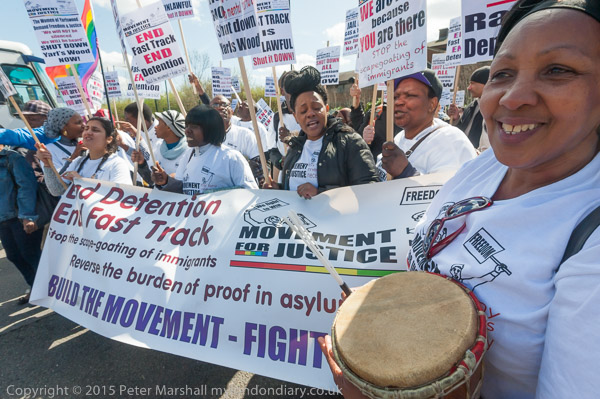
Various organisations had held protests here over the years, but these had grown since Movement for Justice began organising them, bringing a large group of current and former asylum seekers out from London on the tube to Terminal 5 and then on the short bus ride to the prison. They included some who had come from other cities in the country – and even from Glasgow. Other groups at the protest included No Borders, Southall Black Sisters and Shoreditch Sisters W I.
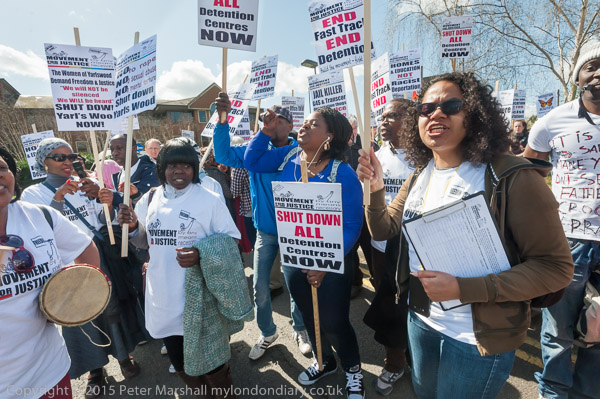
There are two detention prisons on the site, both surrounded by 20ft high fences with a private road to a BT site running between them. Called Harmondsworth and Colnbrook, they were in 2015 both run by Mitie’s ‘care+custody’ division, and the overall name for the centre had changed to Heathrow Immigration Removal Centre, which made clear that the government intention was to deport people rather than operate a fair asylum system.
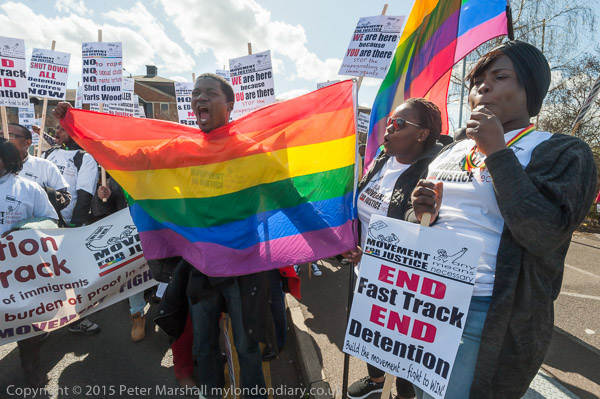
The Home Office has long proved itself to be both incompetent and racist, and huge backlogs have built up over the processing of asylum claims. They seem to start from the position that all asylum claims are unfounded and those making them are liars, often despite the evidence. Claims that should be processed in days take months or years – during which time people may be kept in detention centres like these generally quite unnecessarily. We should imprison criminals, not asylum seekers.
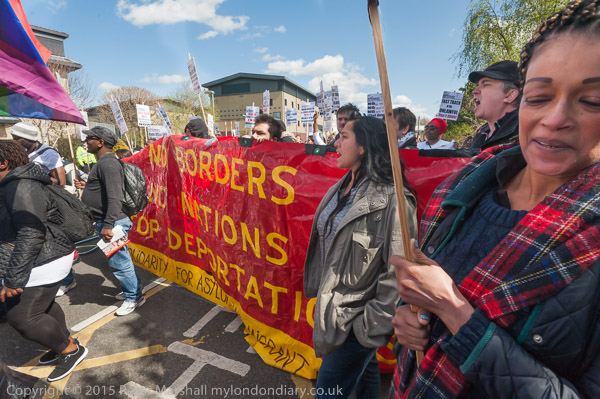
As I commented in 2015:
“these are prisons, with those inside being unable to leave; they have a few privileges denied those in normal jails, including the use of mobile phones, but some disadvantages, including that they are all on indefinite sentences at the whim of government and subject to a constant threat they will be forcibly bundled onto a plane and taken back to the country from which they have fled, often at fear of their lives. These prisons are also run by staff who often lack the basic training, supervision and accountability of normal jails.”
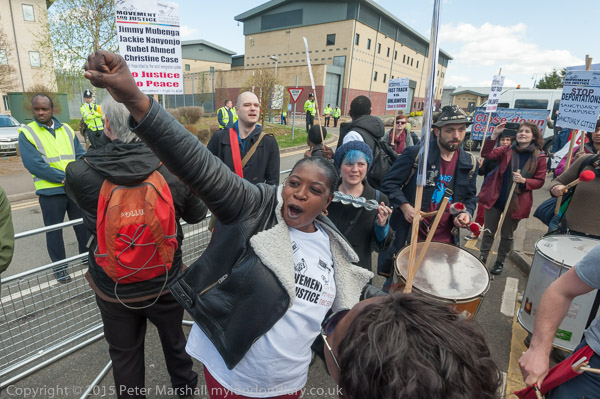
The majority of those who claim asylum are eventually granted leave to remain in the UK as their claims are well-founded. Some have been deported before they are given time to prove their cases to the Home Office’s satisfaction under “fast track” procedures that have been ruled illegal.
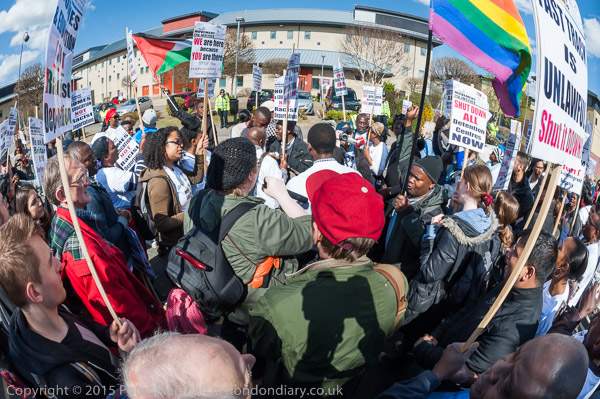
Our laws prevent them from working and contributing to our economy and society, and almost all are keen to do so and have skills which are in short supply. We need a system that gives people the medical treatment they need and gets them back into normal work and life as quickly as possible. Instead far too many are simply parked in prisons like these without proper medical care and largely isolated from those who could help them. Its both inhumane and economically unsound.
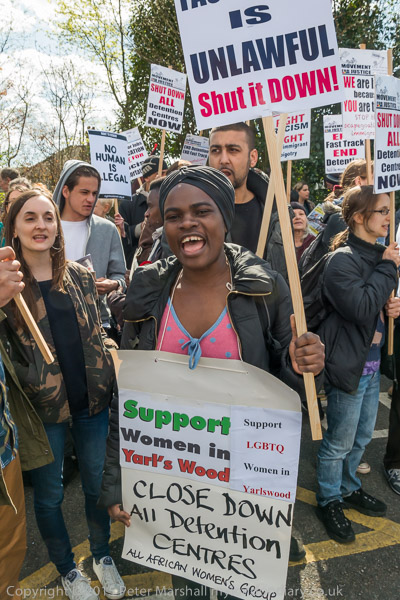
Although police and a large team of security guards stopped the protesters from going down the road toward the prison blocks, forcing them into a pen in front of the administration building at the front of the site, the loud protest could be heard throughout the site. Some of the prisoners were able to use their mobile phones to welcome the protesters and let them known about the poor conditions inside, and their calls were relayed over the public address system the protesters had brought.
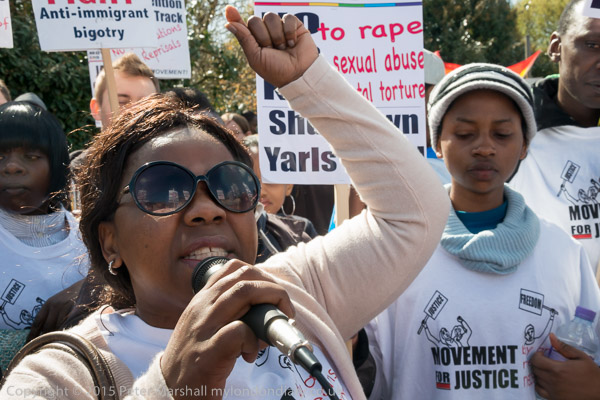
Most of those who spoke at the protest had themselves been held inside these or other detention centres often for long periods after escaping from beatings, rape and torture in their home countries, and several spoke about their experiences in the system here. Some said they had been treated as troublemakers because they stood up for their rights – and that inmates who failed to do so, whatever the strength of their cases, were likely to face deportation.
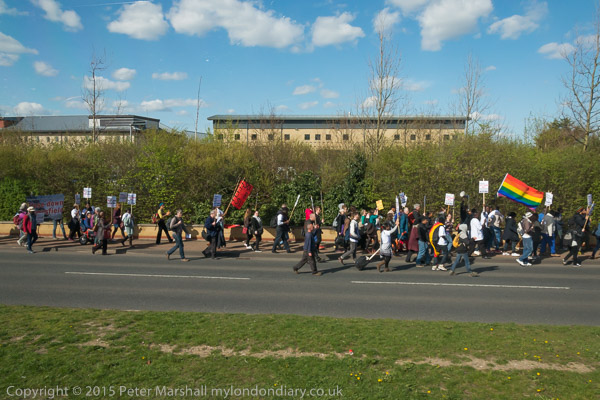
I was tired after a couple of hours of the noisy protest, with chanting, singing and dancing – though mainly I had just been taking photographs, and left to catch a bus home. I could hear the protest continuing from the bus stop several hundred yards away, and when the bus came – ten minutes late – saw the protesters making their way out of the site to a public footpath which runs along the side of the Colnbrook site to continue their protest closer to those prison blocks.
Many more pictures on My London Diary at End Immigration Detention.
Flickr – Facebook – My London Diary – Hull Photos – Lea Valley – Paris
London’s Industrial Heritage – London Photos
All photographs on this page are copyright © Peter Marshall.
Contact me to buy prints or licence to reproduce.